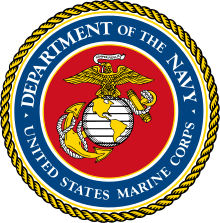The Basic School
| The Basic School | |
|---|---|
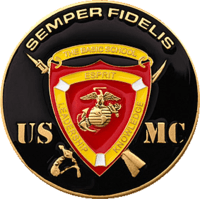 The Basic School Insignia | |
| Country | United States |
| Branch | USMC |
| Type | Training |
| Role | Train and educate newly commissioned or appointed United States Marine Corps Officers |
| Part of | Training and Education Command |
| Garrison/HQ | Camp Barrett, Virginia |
| Commanders | |
| Current commander | Colonel David R. Everly |
| Notable commanders |
General James T. Conway General John R. Allen |
The Basic School (TBS) is where all newly commissioned and appointed (for warrant officers) United States Marine Corps officers are taught the basics of being an "Officer of Marines". The Basic School is at Camp Barrett, Quantico, Virginia, in the south-west of the Marine Corps Base Quantico complex. Each year over 1,700 new officers are trained, representing such diverse commissioning sources as the U.S. Naval Academy, Naval ROTC, the Platoon Leaders Class program (PLC-Air, PLC-Ground, PLC-Law) for non-NROTC college and university students, Officer Candidates School, and Marine Corps Limited Duty Officer (LDO) and Warrant Officer accession programs.
Philosophy of instruction at TBS
The School's "Five Horizontal Themes" define the expectations of every student officer at TBS.
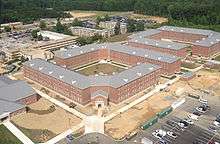
They are:
- A Man or Woman of Exemplary Character
- Has a clear understanding that a Marine commission brings with it "special trust and confidence" and the highest expectations of the American people.
- Devoted to our Core Values of Honor, Courage and Commitment
- Possesses a moral compass that unerringly points to "do the right thing" – an ethical warrior
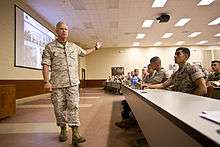
- Devoted to Leading Marines 24/7
- Embraces the "exceptional and unremitting" responsibility to one's Marines and their families
- Inspires and instills confidence in his/her Marines during times of adversity
- Adheres to and enforces standards regardless of time of day, location or duty status
- Treats all Marines and Sailors with dignity and respect
- Dedicated to a lifetime of study and learning about the profession of arms
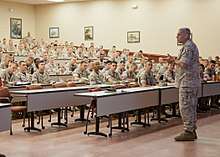
- Able to Decide, Communicate, and Act in the fog of war
- Can think critically and arrive at an acceptable decision based on sound tactical thinking within their commander's intent
- Communicates clearly both orally and in writing in tactical and administrative situations with emphasis on issuing clear, meaningful orders and guidance
- Has a bias for action – seizes the initiative and acts instead of waiting for the perfect sight picture or direction from higher
- Once action is initiated, acts with boldness and determination
- A Warfighter who embraces the Corps's warrior ethos
- A competent combat leader, grounded in the basic infantry skills, and characterized by sound judgment and aggressiveness in execution
- Educated in the fundamentals of maneuver warfare, tactics, combined arms, and the time-tested principles of battle
- Maintains an offensive mindset throughout – proactive, not reactive
- Mentally Strong and Physically Tough
- Imbued with a warrior spirit and able to thrive in a complex and chaotic environment and persevere despite the obstacles to mission accomplishment
- Possesses the self-discipline to push past preconceived limits[1]
Courses conducted at TBS
Basic Officer Course (BOC)
Introduction and background
After earning a commission, Unrestricted Line Officer Marine lieutenants complete the Officer Basic Course prior to beginning their Military Occupational Speciality (MOS) qualification training to prepare them for service in the Fleet Marine Force or other operating forces assignments (viz., Marine Corps Security Force Regiment or the Marine Corps Embassy Security Group). The majority of Marine Corps officers are commissioned through the USMC Officer Candidate School (OCS), most of the balance are commissioned through the Marine Corps option at either the U.S. Naval Academy or the Naval Reserve Officer Training Corps (NROTC) at a civilian college or university. (Annually, there are a few officers who graduate from one of the other US federal service academies who are granted permission to receive USMC commissions.) Restricted Line/Limited Duty Officers are direct commissioned from the chief warrant officer ranks as either a first lieutenant or captain and do not attend BOC; however, as warrant officers they have already completed the WOBC at TBS prior to beginning their officer service in the operating forces.
Most officers attend BOC as a second lieutenant immediately after commissioning at OCS or within a few months of graduation and commissioning from either the USNA or an NROTC program. Some newly commissioned officers may serve a short period of time in an interim assignment (such as an assistant athletic coach at the USNA) before beginning TBS/BOC. A few officers attend BOC as a first lieutenant because they were commissioned through the Platoon Leaders Class (PLC Law) program, which permits them to attend law school as second lieutenants and then attend TBS/BOC after promotion to first lieutenant upon receiving their law degree. In very rare cases, an officer who receives an initial commission in another branch of the US armed forces, and who has already been promoted to first lieutenant, may receive an interservice transfer to the Marine Corps and attend TBS as a first lieutenant.
Course overview
The Officer Basic Course currently lasts 28 weeks, during which new officers receive classroom, field, and practical application training on weapons, tactics, leadership and protocol. Classroom events include platform instruction, tactical decision games (TDGs), sand table exercises (STEXs), decision-forcing cases, and small group discussions. There are various field events, beginning with fireteam and squad level, and progressing to platoon-reinforced and company-sized events. The field events consist of realistic blank-fire training and live fire ranges.
Phases of instruction
- Phase I (7 Weeks): Individual Skills
- Leadership
- Rifle and Pistol Qualification
- Land Navigation
- Communications
- Combat Lifesaving
- MCMAP
- Phase II (6 Weeks): Rifle Squad Leader Skills
- Decision-making
- Combined Arms
- Rifle Squad Tactics/Weapons
- Scouting and Patrolling
- Phase III (6 Weeks): Rifle Platoon Commander Skills
- Rifle Platoon Tactics
- Convoy Operations
- Engineering
- Crew-served weapons
- Phase IV (7 Weeks): Basic MAGTF Officer Skills
- MOUT
- Rifle Platoon (REIN) Tactics
- Force Protection
- Expeditionary Operations (AMFEX)
- Legal/Platoon Cmdr's Admin
MOS selection and post BOC training and assignments
Nearing completion of BOC, lieutenants are selected for an MOS, including approximately 1/3 of the officers to Infantry (includes Light Armored Reconnaissance) and other ground combat specialties, another 1/3 to Marine Aviation (including Naval Aviators – aircraft pilots, Naval Flight Officers – aircraft weapons, navigation, and sensor systems officers, and aviation command and control, and air defense positions), and the remaining 1/3 to logistics combat (combat support and combat service support), or headquarters/command and control – C4ISTAREW) positions.
These include:
Ground Combat Element (GCE) – (Combat Support): Assault Amphibian, Combat Engineer, Field Artillery, Ground Intelligence, and Tank
Aviation Combat Element (ACE) – (Aviation Support): Air Defense Control, Air Intelligence, Air Support Control, Air Traffic Control, Aircraft Maintenance, Aviation Supply, Low Altitude Air Defense
Logistics Combat Element (LGE) – (Combat Service Support): Financial Management, Ground Supply, Logistics (landing support and motor transport), Manpower, Personnel and Administration, Personnel Retrieval and Processing, and Substance Abuse Control.
Command Element (CE) – (Command and control): Civil Affairs, Communications and MAGTF Communications Planner, Counterintelligence/Human Source Intelligence, Intelligence, MAGTF Intelligence, Judge Advocate, MAGTF Plans, Military Police/Law Enforcement, Military Information Support Operations (Psychological Operations), Public Affairs, and Signals Intelligence/Ground Electronic Warfare.
Following BOC, the officer will attend one or more additional schools to be trained in their specialty, and then assigned to a unit in the Fleet Marine Force or other operating forces of the Marine Corps (e.g., Marine Barracks, Washington, DC, Marine Corps Chemical Biological Incident Response Force, Marine Corps Security Force Regiment, or the Marine Corps Embassy Security Group.
Warrant Officer Basic Course (WOBC)
Marine warrant officers attend a 16-week training regime similar in scope and instruction to the 28-week course required of second lieutenants, which is shortened due to the prior experience possessed by the newly appointed warrant officers. They are assigned to India Company at Camp Barrett.
An enlisted Marine can apply for the warrant officer program after serving at least eight years of enlisted service, and reaching the grade of E-5 (Sergeant) for the administrative warrant officer program. For the Marine Warrant Officer (Gunner) program, a Marine must have at least sixteen years of enlisted service in an infantry MOS. This requirement is waived for those holding rank of (Gunnery Sergeant) for a minimum of one year prior to applying for the weapons warrant officer program[2]. Sergeants or Staff NCOs who are selected are given additional leadership and management training during the Warrant Officer Basic Course.[3]
Infantry Officer Course (IOC)
Graduates of the BOC who are selected for an infantry MOS remain at TBS for the twelve-week Infantry Officer Course. During this program lieutenants receive intensive classroom instruction, practical experience, and field training in crew-served weapons, patrolling, and reconnaissance to ensure that they are MOS qualified for all of the infantry platoon commander billets, in addition to the rifle platoon, within a Marine infantry battalion. The other infantry billets are: rifle company weapons platoon (i.e., crew-served weapons) commander, as well as commander of one of the three heavy-weapons platoons (viz., 81mm mortar, antiarmor, and heavy machine gun) of the infantry battalion weapons company. Infantry officers may seek to compete for a tour as a reconnaissance platoon commander after serving an initial tour with an infantry unit.
Officers selected to serve in a Light Armored Reconnaissance (LAR) battalion complete an additional six-week LAR leaders course conducted at the School of Infantry.
See also
| Wikimedia Commons has media related to The Basic School. |
Notes
- ↑ "The Basic School". Headquarters Marine Corps. Retrieved 17 September 2007.
- ↑ "FISCAL YEAR 2018 (FY18) ENLISTED TO WARRANT OFFICER (WO) MARINE GUNNER SELECTION BOARD > The Official United States Marine Corps Public Website > Marines.mil - MARADMINS". www.marines.mil. Retrieved 2018-05-18.
- ↑ General Emphasizes Leadership at Warrant Officer Commissioning 2nd Lt. Patrick Boyce, 8 February 2007. Retrieved 25 January 2011.
References

- Web
- Official website
- Official Descriptions MOS's
- "The Basic School", The Making of a Marine Officer, MarineTimes.com.
- Quantico: Marine Combat Development Command – The Basic School
